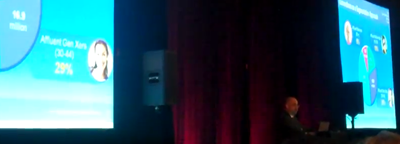- About
- Subscribe Now
- New York,
September 14, 2011


NEW YORK – Luxury marketers should be focusing on the affluent family as its own marketing segment, according to findings from the recent Ipsos Mendelsohn 2011 Annual Affluent Survey.
Brands that market to the affluent family as a whole have a higher chance of seeing ROI since the family generally buys products in mass, particularly in the digital and consumer electronic goods industries. This year was the first time that the affluent family was explored by Ipsos Mendelsohn.
“If you think about the events of the past two decades, you really get a pattern of institutions letting the people down,” said Donna Sabino, senior vice president of kids and family insights with Ipsos OTX, New York.
“This really led to a feeling of being out of control, so as much as [an affluent person] thinks they are part of that process, we’ve learned that they’re really not,” she said.
“So, with those sentiments in mind, affluent consumers have been making investments in the one place they feel they can really make a difference and be in control and that is their family.”
Ipsos Mendelsohn's survey is based on 14,405 representative interviews with adults who have more than $100,000 in annual household income, which collectively represents 58.5 million adults.
Family value
The affluent family is an emerging marketing segment, largely in part due to changes in family dynamic.
Purchasing decisions are no longer made by the head of house, but are largely discussed and influenced by the children, according to Ms. Sabino.
Particularly in the digital and mobile arena, mature affluents are looking to their tech-savvy kids for advice on electronic products such as mobile phones, tablets and laptops or computers.
The study found that affluent families tend to buy digital goods in mass.
For example, if the head of house buys a new mobile phone, the children and spouse are likely to ask for the same phone, turning one purchase into a family plan, per Ms. Sabino.
However, electronic goods are the not only category in which the affluent family discusses purchasing decisions.
Children may also heavy influencers on vacation locations and new houses or renovations.
For example, Four Seasons has been catering to children at many of its locations, and has even started a blog on family travel at http://family.fourseasons.com.

“One of the things [Ipsos Mendelsohn] was really excited to see was that family status impacts everything,” Ms. Sabino said.
“I’m talking everything from what they do, to where they buy, to when they buy it,” she said. “It also affects the way in which they spend their time and where they do it.”
Additionally, marketers should note that affluent consumers with children under 18 were more likely to be present on a social network such as Facebook than those without children.

Generation check
Along with affluent families, Ipsos Mendehlson focused on affluent consumer demographics to see where each age group falls on various marketing platforms.
Age, generation and family dynamics are what we can focus on today to slice and dice the affluent population, according to Steve Kraus, chief research and insights officer at Ipsos Mendelsohn, San Francisco.
Not surprisingly, millennials are the heaviest social media users, with half of the group reporting that they check their emails or Facebook within 30 minutes of waking up.
Additionally, millennials are more likely to say music is important and to keep up with technological developments.
Luxury beverage Patron seemed to be aware of this trend when it conducted its XO Café Music Project which gave three rising stars the chance to win promotions, touring or recording packages if they posted a video on Facebook (see story).
The millenial demographic is much more likely than other generations to report that they are interested in fashion, trends and designer brands, per the study.
Therefore, luxury fashion brands may want to focus on reaching millennials through digital platforms.
“What stands out about millennials is social networking,” Mr. Kraus said. “But, if you broaden the scope, Generation Xers are very much just as tech-savvy.
“They are just as likely to own smartphones and download apps,” he said. “And they are more likely to own a tablet.”
In addition, Gen X is more likely to be focused on their careers than other generations, whereas baby boomers are focusing on their families.
The baby boomer generation is also the most likely to report feeling the effects of the current economy, and be looking to cutback.
Surprisingly, affluent seniors have, in many ways, an attractive profile for marketers.
This is because they have a higher net-value than any other generation, according to Mr. Kraus.
Affluent seniors are also most likely to own a Rolex and a luxury car and to travel abroad, per Mr. Kraus.
“[Indeed], 73 percent of affluent seniors say they always wear a wristwatch, and only 30 percent of millennials say they do, and that really shows a difference in the generations,” Mr. Kraus said.
“Obviously, you see [that] generations are a very powerful and intuitive in a way that many marketers in all industries can use,” he said.
Final Take
Kayla Hutzler, editorial assistant on Luxury Daily, New York
Share your thoughts. Click here